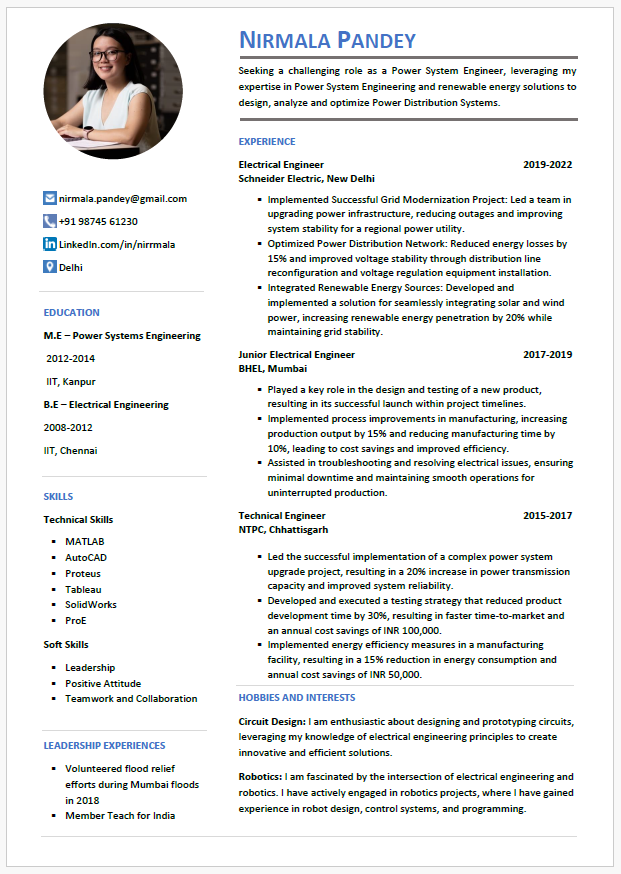Electrical Engineer
M.E – Power Systems Engineering

About this template
This is a very professional resume which can significantly enhance your job prospects.
With its clean, modern design and industry-tailored layout, it highlights your skills and achievements, making a strong impression on recruiters.
Some most common and important technical skills for Electrical Engineer
Here are some of the most common and important technical skills for an Electrical Engineer, each explained briefly:
1. Circuit Design:
Circuit design is fundamental in electrical engineering. Proficiency in designing and analyzing electrical circuits using software like SPICE or MATLAB is essential for creating reliable and efficient electrical systems.
2. Power Systems:
Understanding power systems, including generation, transmission, and distribution, is crucial. This skill enables engineers to design and maintain electrical grids, ensuring efficient and stable power supply.
3. Control Systems:
Control systems engineering involves designing systems that control dynamic processes. Skills in using tools like MATLAB/Simulink for modeling and simulation help in developing systems that maintain desired outputs despite disturbances.
4. Embedded Systems:
Embedded systems skills involve designing and programming microcontrollers and processors used in devices. Proficiency in languages like C/C++ and understanding hardware-software integration are vital for creating smart devices and applications.
5. Electronics Troubleshooting:
Troubleshooting skills are essential for diagnosing and fixing issues in electrical circuits and systems. This involves a strong understanding of electronic components, schematics, and the ability to use diagnostic tools effectively.
6. Electrical Safety Standards:
Knowledge of electrical safety standards (such as NEC, IEC) is critical to ensure that designs and installations comply with regulations. This skill helps in preventing accidents and ensuring the safe operation of electrical systems.
7. Digital Signal Processing (DSP):
DSP involves analyzing and manipulating signals to improve their quality. Proficiency in DSP techniques and tools like MATLAB is important for applications in telecommunications, audio processing, and control systems.
8. Renewable Energy Systems:
As the demand for sustainable energy grows, skills in renewable energy systems, such as solar and wind power, are increasingly important. This includes understanding the design, implementation, and integration of these systems into the grid.
9. Project Management:
Project management skills are necessary for planning, executing, and overseeing electrical engineering projects. Familiarity with tools like MS Project and methodologies like Agile ensures that projects are completed on time and within budget.
10. Automation and PLC Programming:
Automation skills, including proficiency in PLC (Programmable Logic Controller) programming, are crucial for designing automated systems in manufacturing and industrial processes. This involves creating and maintaining programs that control machinery and processes.
Conclusion:
These technical skills are foundational for an Electrical Engineer, enabling them to design, analyze, and maintain various electrical systems while ensuring safety, efficiency, and compliance with industry standards.